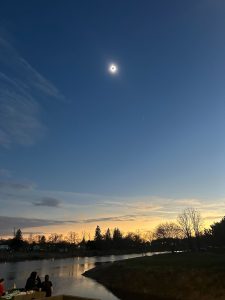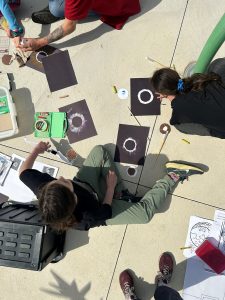The buds of a partnership between the Dunlap Institute, the David A. Dunlap Department of Astronomy and Astrophysics, and Kâpapâmahchakwêw — Wandering Spirit School in Toronto started to bloom in time for this year’s total solar eclipse.
Kâpapâmahchakwêw — Wandering Spirit School provides Indigenous students from kindergarten to grade 12 the opportunity to learn about the teachings and ways of Anishinaabe Peoples.

On April 8, astronomers from the University of Toronto traveled down to Chiefswood Park on Six Nations of the Grand River to experience the once-in-a-lifetime eclipse with students, their caregivers, and teachers from Wandering Spirit. Two buses of eager eclipse viewers beat heavy traffic just as the thick cloud cover gave way to an unforgettable moment.
“You could hear lots of kids screaming in excitement and people gasping in awe at seeing totality,” says Suresh Sivanandam, director of the Dunlap Institute.
“It was magic,” says Roberto Abraham, chair of the Department of Astronomy and Astrophysics. “Once you see a total solar eclipse, you won’t be the same person afterwards.”
They also had telescopes with solar filters pointed at the sky for viewers to study sunspots and watch as the moon slowly eclipsed the sun. Curious young learners asked astronomers about what powers the sun and how big the Earth is compared to the sun and the moon.
Abraham was the same age as some of the students from Wandering Spirit the first time he saw a total solar eclipse, and it inspired him to dedicate his life to science. While it may do the same for some of those students, above all, Abraham and Sivanandam were overjoyed to share the excitement of the eclipse with members of the school.

“When I walked out of there, I thought: These are the moments in my job where I feel completely fulfilled because I helped other people experience the joy of astronomy,” Sivanandam says.
The roots of this partnership stretch back to 2022. Emma Stromberg, the Faculty of Arts & Science’s indigenous partnership adviser, approached Dunlap leadership alongside Professor Susan Hill, Director of the Centre for Indigenous Studies, with an opportunity to work with teachers and students from Wandering Spirit.
“These partnerships, this kind of work, it takes time,” Stromberg says. “We wanted to see if we could match up the needs and interests of the school to resources at U of T, to build something that can be sustained.”
Earlier this year, Sivanandam and Abraham visited the school to meet with students, teachers, and staff and hear about how astronomers at U of T can support them. The groundwork is currently being set for a coding club, mentoring and tutoring programs, and training for teachers.

Sivanandam hopes to expose Indigenous children to the opportunities available to them at universities at a younger age and emphasize that they can use their curiosity with some skills to make a difference. He wants young students to know that they can be excited to learn math and science.
Approximately 20 members of the institute and department have also volunteered to help. Many recently participated in a workshop with John Croutch from the Office of Indigenous Initiatives to learn about the continued impacts of settler colonialism in Canada and what it means to be an ally to Indigenous peoples. While settlers have benefited from the dispossession and forced removal of Indigenous peoples from their traditional lands, Indigenous people continue to face systemic barriers to education, jobs, and necessities like safe housing and clean water.
“Consistent with U of T’s commitments to reconciliation, it is incumbent on all of us to think of ways to redress, in small and big ways, the impacts of settler colonialism and push resources into the community wherever possible,” Stromberg says.

